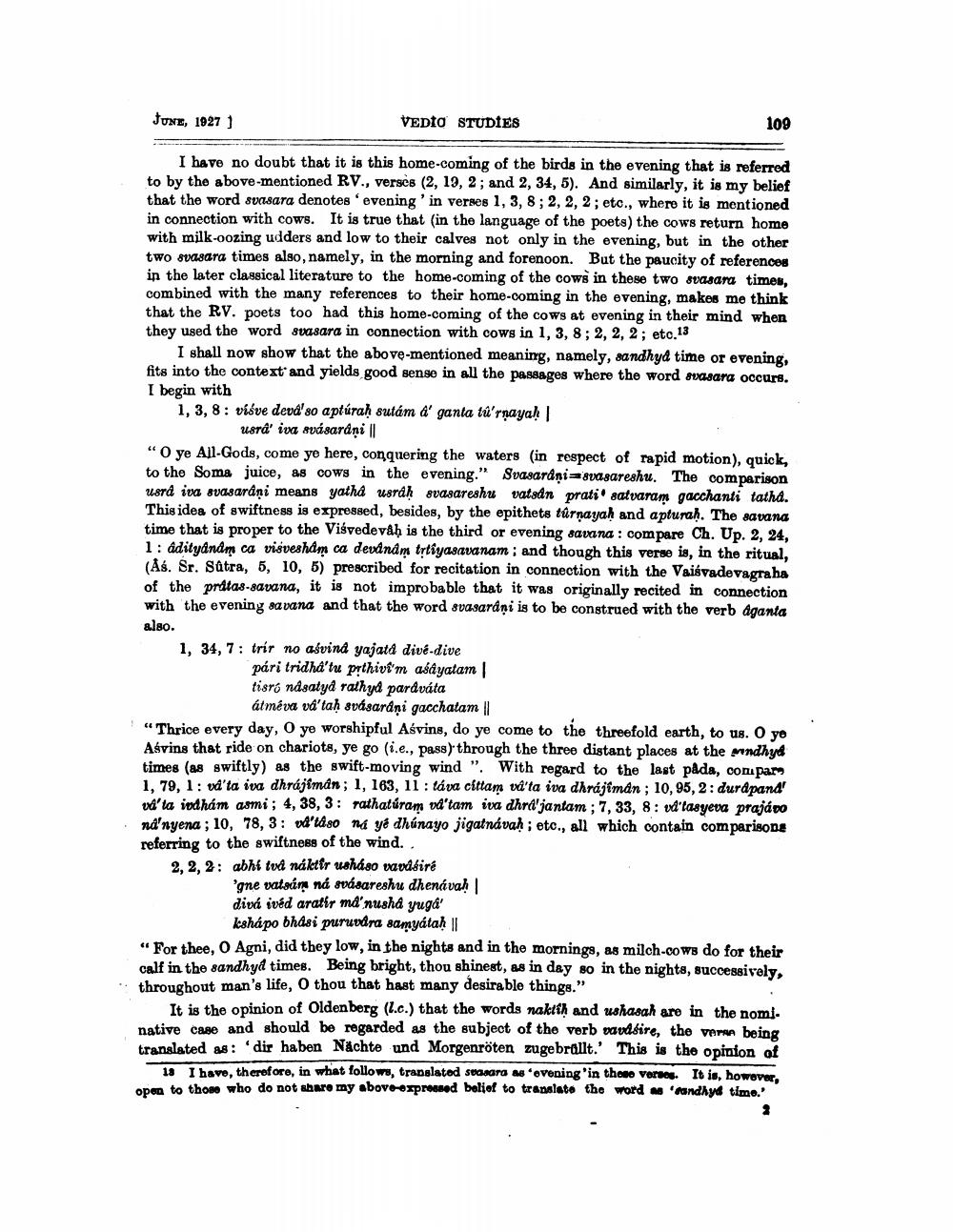________________
JUNE, 1927)
VEDIO STUDIES
109
I have no doubt that it is this home-coming of the birds in the evening that is referred to by the above-mentioned RV., verses (2, 13, 2; and 2, 34, 5). And similarly, it is my belief that the word sviisara denotes evening 'in verses 1, 3, 8; 2, 2, 2; etc., where it is mentioned in connection with cows. It is true that in the language of the poets) the cows return home with milk-oozing udders and low to their calves not only in the evening, but in the other two svasara times also, namely, in the morning and forenoon. But the paucity of references in the later classical literature to the home-coming of the cows in these two svasara times, combined with the many references to their home-coming in the evening, makes me think that the RV. poets too had this home-coming of the cows at evening in their mind when they used the word svasara in connection with cows in 1, 3, 8; 2, 2, 2; etc.13
I shall now show that the above-mentioned meaning, namely, sandhyd time or evening, fits into the context and yields good sense in all the passages where the word svasara occurs. I begin with 1, 3, 8: visve devá' 80 aptúrah sutám &' ganta tú'rnayah
usra' iva svásaráni || “Oye All-Gods, come ye here, conquering the waters (in respect of rapid motion), quick, to the Soma juice, as cows in the evening." Svasardni svasareshu. The comparison usrd iva svasardni means yatha urdh svasareshu vatsdn prati. satvaram gacchanti tatha. This idea of swiftness is expressed, besides, by the epithets turnayah and apturah. The savana time that is proper to the Viśvedevah is the third or evening savana : compare Ch. Up. 2, 24, 1: Adityandm ca visvesham ca devinam trtiyasavanam; and though this verse is, in the ritual, (Åś. Sr. Sûtra, 5, 10, 5) prescribed for recitation in connection with the Vaišvadevagraha of the pritas-savana, it is not improbable that it was originally recited in connection with the evening savana and that the word svasaraņi is to be construed with the verb aganta also. 1, 34, 7: trir no asvind yajatd divé dive
pári tridha' tu prthivi'm aśdyatam tisrondsatyd rathyd paráváta
átméra vá'tah svásardņi gacchatam | u Thrice every day, O ye worshipful Asvins, do ye come to the threefold earth, to us. O vo Asvins that ride on chariote, ye go (i.e., pass) through the three distant places at the windhyd times (as swiftly) as the swift-moving wind". With regard to the last pada, con par 1, 79, 1: vá'ta iva dhrájímán; 1, 163, 11 : láva cittam vd'ta iva dhrájíman; 10,95, 2:durdpand' w' ta indham asmi; 4, 38, 3: rathatúram vd'tam iva dhra'jantam : 7, 33, 8: vd'tasyeva prajápo na nyena; 10, 78, 3: ud'ta so me ye dhúnayo jigatnávah, etc., all which contain comparisons referring to the swiftness of the wind.. 2, 2, 2: abhi tud náktfr ushaso wavdfire
gne valsing ná svásareshu dhenavah divá ivéd aratir má nusha yuga'
kshápo bhasi puruvdra samyátah || a for thee, O Agni, did they low, in the nights and in the mornings, as milch-cows do for their calf in the sandhyd times. Being bright, thou shinest, as in day so in the nights, successively, throughout man's life, O thou that hast many desirable things."
It is the opinion of Oldenberg (1.c.) that the words naktih and ushasah are in the nomi. native case and should be regarded as the subject of the verb vaudfire, the verin being translated as: 'dir haben Nächte und Morgenröten zugebrallt.' This is the opinion of
18 I have, therefore, in what follows, translated svasara as 'ovening 'in thero versos. It is, however, open to those who do not share my above expressed belief to translate the word m andhyd time,




